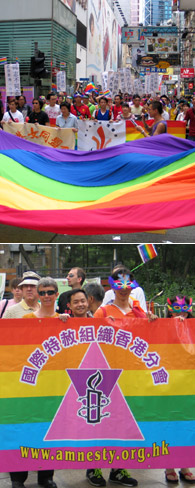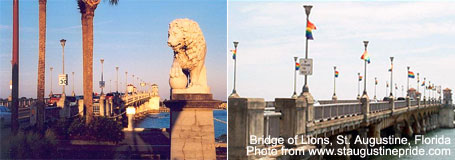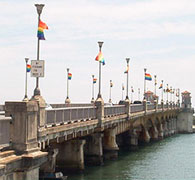Nobody marches like we do.
Think about it. Not women. Not trade unionists. Not anti-war activists. Not anti-globalists. Nobody marches like we do. It's now our specialty.

HK gays and lesbians hold first gay rights rally on May 16, 2005, to mark International Day Against Homophobia (IDAHO) which commemorates the removal by the World Health Organisation of homosexuality from its list of mental disorders on May 17, 1990.
Some 1.8 million people showed up in Sao Paulo, Brazil, on May 29, according to police estimates. Organisers said it was 2 million. Globo News network called it the biggest tourist event of the year.
In Asia, we march/ parade/ flaunt in Manila, Tokyo, Osaka, Sapporo, Taipei, Seoul, Bangkok, Phuket, Pattaya and Kolkata.
Gay activist Chung To used to get annoyed with outsiders who expressed surprise that there was no march in Hong Kong. Everyplace should do what works for them, he argued. Philippino expat Martin Manalansan denounced living "in the shadow of Stonewall," with our strategies dictated by an American model (though he lives in Illinois).
But everybody loves a parade - police willing.
In the early days of activism, parades had the great benefit of not costing any money. Now they are big budget events in the West, with corporate sponsors. Some have gone bankrupt, proving they are big money events.
This year Hong Kong celebrated the (new) International Day Against Homophobia with a parade on May 16th. The parade supported the campaign for an anti-discrimination law covering sexual orientation. Chung To was there. Will the march become an annual event? My guess is yes.
Switch to Eastern Europe.
About 500 marched through central Bucharest on May 28, the first pride parade in Romania. The country decriminalised homosexual acts in 2001. Why? It wants to join the European Union. Too bad Singapore isn't eligible to join.
Romanian President Train Basecu met with Mayor Andrieau Videanu to convince him not to block the parade. Police detained ten members of a right wing group that had tried to break through the police lines protecting the marchers.
But the story was different in Poland.
Annual gay parades began in Warsaw in 2001. The first parade in Krakow was held in 2004. Almost 1,500 people were there. But as soon as the parade reached the landmark Wawel Castle, it was attacked by 300 members of a right wing group, the League of Polish Families.
Shortly after the Krakow fights, Warsaw Mayor Lech Kaczynski banned the fourth parade in his city, citing plans for a counter-demonstration. Around 500 activists rallied in front of city hall, chanting "homophobe."
Kaczynski, with presidential ambitions, continued his campaign by banning the 2005 parade. He is "for tolerance, but against propagating gay orientation." Poland is already in the EU, so it doesn't have to worry so much about offending the rest of Europe. And Poland, of course, is still mourning the death of its favourite son, the homophobic Polish pope.
Oddly the play "I Am My Own Wife," by New York author Doug Wright, had already opened in Warsaw as the fights over the parade unfolded. The play tells the story of the East German gay transvestite, Charlotte Mahlsdorf, who defied both Nazi and Communist regimes. Everywhere in Warsaw there were pictures of the dead Pope and posters about Charlotte.
In defiance of the mayor's ban, the march went ahead on June 11, as originally planned. 2,500 people showed up, along with about 300 opponents. Police contained attacks near the end of the march. A few people were injured.
Claudia Roth, International Human Rights Ombudsman for the German Government, was there: "We want to show that those who fight for the civic rights of gays and lesbians in Poland are not alone." She was joined by gay German member of parliament Volkar Beck and observers from Britain and the United States. Polish Deputy Prime Minister Izabela Jaruga-Nowacka joined them.

Gays, lesbians, bisexuals and transgendered people face two peculiar problems - integration and invisibility.

This year, the St. Augustine Pride Committee sued the City for being the only non-profit group ever to be denied permission to fly their flags on the Bridge of Lions - and won!
Unlike women, most gays and lesbians have the choice of being invisible - with the passive consent of the majority, who prefer that we remain in the closet. They did not want to see us. That creates the possibility of not being seen. "Malaysia tolerates the invisible homosexual," said one KL activist.
A Catalonian gay group did an anti-discrimination poster in the 1990s with four faces representing groups that were commonly discriminated against in Spain. Oscar Wilde represented homosexuals. Who else was there as a recognisable public gay figure? Probably the only other choice would have been Elton John, with rhinestone eyeglasses.
The way out of the box is to gain visibility. The rationale for marching is clear. Here we are. On your streets. Look at us. Yes, we exist.
In 2003, gays and lesbians in Poland put pictures of themselves on billboards, with the demand "Look at us!" Their campaign got funding from the same Izabela Jaruga-Nowacka who, as Deputy Prime Minister, joined the marchers on June 11. Then she was the minister responsible for sexual equality.
The mayors of Warsaw and Krakow refused to allow the billboards in their cities.
In 2004, a German billboard campaign showed five young men, identifying two as gay, one with a German name and the second with a Turkish name. "Kai is gay. Murat too. They belong to us. Always."
North Carolina billboards showed lesbian and gay couples with children: "We are your neighbours... and we are gay parents." Another billboard campaign in North Carolina pictured four teenagers and the statement "We are your gay youth" followed by a web address. But the company that owned the billboards refused another series that was to read "It's OK to be gay."
Mayors of Canadian cities routinely 'proclaimed' special days and special weeks for various minorities and interest groups. When they refused to proclaim 'Gay Pride,' they were ordered to do so by various provincial human rights commissions. Their refusals picked out gays and lesbians for discriminatory treatment.
The Mayor of the City of Edmonton said it would violate his Roman Catholic beliefs to proclaim gay pride. He refused to do so for eight years. He relented in 2003 when gay groups threatened to take him to the human rights commission. Mayor Smith said his views had not changed - but "I have been advised that if I fail to fulfill my legal obligations� the city of Edmonton would be liable for damages."
The City of St. Augustine in Florida has a "Bridge of Lions." Various local organisations get permission to fly their flags on the bridge. The local Pride Committee applied to fly the rainbow flag. Surprise! Surprise! They became the only non-profit group ever to be denied permission. The City kept revising the requirements - and kept refusing - 2003, 2004, 2005.
So, it being the United States, the Pride Committee sued the City. Their lawyer said flying the flag allowed the group to say 'We exist and this is what we stand for.' They argued freedom of speech and equality.
On June 7th, District Court Judge Adams supported the activists. For six days, 47 rainbow flags will be flying on the Bridge of Lions.
Nobody marches like we do. Maybe, these days, nobody flies flags like we do. We are specialists.
Douglas Sanders lives in Bangkok: sanders_gwb@yahoo.ca











 列印版本
列印版本










讀者回應
搶先發表第一個回應吧!
請先登入再使用此功能。